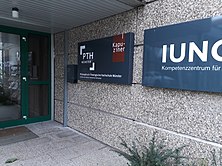Philosophical-Theological University of Münster
| Philosophical-Theological University of Münster | |
|---|---|
| founding | 1971 |
| Sponsorship | German Capuchin Province |
| place | Muenster |
| state |
|
| country |
|
| Rector | Ludger Egidius Schulte OFMCap |
| Students | 17 (WS 2018/19) |
| Website | www.pth-muenster.de |
The Philosophical-Theological University (PTH) is one of eight universities in the Westphalian city of Münster and is sponsored by the German Capuchin Province . Your unique selling point is the focus on theology of spirituality .
history
Since 1998, the university has been the successor to the Philosophical-Theological University of the Franciscans and Capuchin Ministers founded on October 19, 1971 . This was initially the joint study of the German Franciscan provinces , the Viennese and Swiss Franciscan provinces as well as the Rhenish-Westphalian Capuchin Province for the scientific training of the next generation of the order, which then opened up to students who did not belong to one of the orders. On November 2, 1983, the Roman Congregation for Catholic Education gave her the right to introduce the degree course in Catholic theology and to confer the title “Diplom-Theologe”; its state recognition took place by the Ministry of Science and Research of North Rhine-Westphalia on October 21, 1983. After the Franciscans left in 1998, the PTH remained under the sole responsibility of the Rhenish-Westphalian Capuchin Province, and since 2011 the German Capuchin Province. Since April 2016, the PTH has been affiliated with the Institute IUNCTUS - Competence Center for Christian Spirituality , which emerged from the merging of the Institute for Spirituality with the Institute for Church, Management and Spirituality .
From 2004 to February 1, 2020, the university was located in the Harenbergsche Villa of the former Jewish grain trader Max Cohnen from the 1920s on Hohenzollernring. Due to the concentration and restructuring of the university's academic activities into a graduate college for theology of spirituality, the university management, together with the sponsor, the German Capuchin Province, made the decision to relocate the operation of the PTH from the Hohenzollernring to Kapuzinerstraße in the immediate vicinity of the Capuchin monastery .
courses
As a graduate college for theology of spirituality, the PTH offers qualified academic further education in the field of theology of spirituality for theologians who have already graduated. All offers of the college reflect on a theological level spiritual traditions, spiritual experiences, processes and spiritual practice in a post-secular world. In the sense of a theologically justified differentiation of the spirits, studying at the Graduate School enables a differentiation of beliefs.
For graduate theologians with a church degree, diploma or Magister Theologiae , the PTH offers a graduate course as a four-semester (two-year) course that leads to the completion of a licentiate in Catholic theology. This qualification is a world-church recognized license to teach theology and spirituality at religious colleges, seminaries, church educational institutions and adult education institutions. The graduate course not only deals with the Christian faith and its mystical tradition, but also enters into dialogue with other religions and spiritual paths. Graduates of the course are qualified to teach and theoretically deal with the theology of spirituality.
As an option, individual thematic modules of the course can be individually selected and completed with various certificates. The prerequisite for this is knowledge of theology at bachelor's level or the state examination.
In addition to the graduate course, a doctorate in theology in the subject of theology of spirituality can be obtained through cooperation with the Pontifical University of Antonianum .
Institutes of the PTH
- The pastoral seminary is an institute of priestly formation. Here religious priests can complete their pastoral training and conclude with the service examination.
-
IUNCTUS - The Competence Center for Christian Spirituality deals fundamentally and application-oriented with questions of theology and spirituality in teaching and research, also in exchange with other sciences (e.g. psychology, management theory). In addition to research, the focus is on conveying content and reflecting on personal values in different areas of life. The center offers advanced training programs, advice and coaching for individuals and organizations. It has six departments:
- Franciscan Mendicantic Spirituality
- History and Theology of Spirituality
- Business and Leadership
- Spirituality and ecology
- Diagnosis of time in a secular society
- Spirituality and Health
- The Institute for Theological Zoology , founded in 2008, has had the status of an affiliated institute at the university since 2009. Its goal is to work out the relationship between humans and animals as the fulfillment of a spirituality according to creation.
Web links
Individual evidence
- ↑ Federal Statistical Office: Students at universities. Winter semester 2018/2019 (= Fachserie 11, Reihe 4.1), October 18, 2019, p. 70.
- ↑ Dieter Berg (Ed.): Traces of Franciscan History. Werl 1999, pp. 621-641.
- ↑ pth-muenster.de: history .
- ↑ pht-muenster.de: Licentiate Regulations (July 10, 2018).
- ↑ pth-muenster.de: PhD course
- ↑ pth-muenster.de: Pastoral seminar
- ↑ pth-muenster.de: The Institute of Theological Zoology .
Coordinates: 51 ° 57 ′ 36.2 " N , 7 ° 38 ′ 52" E

